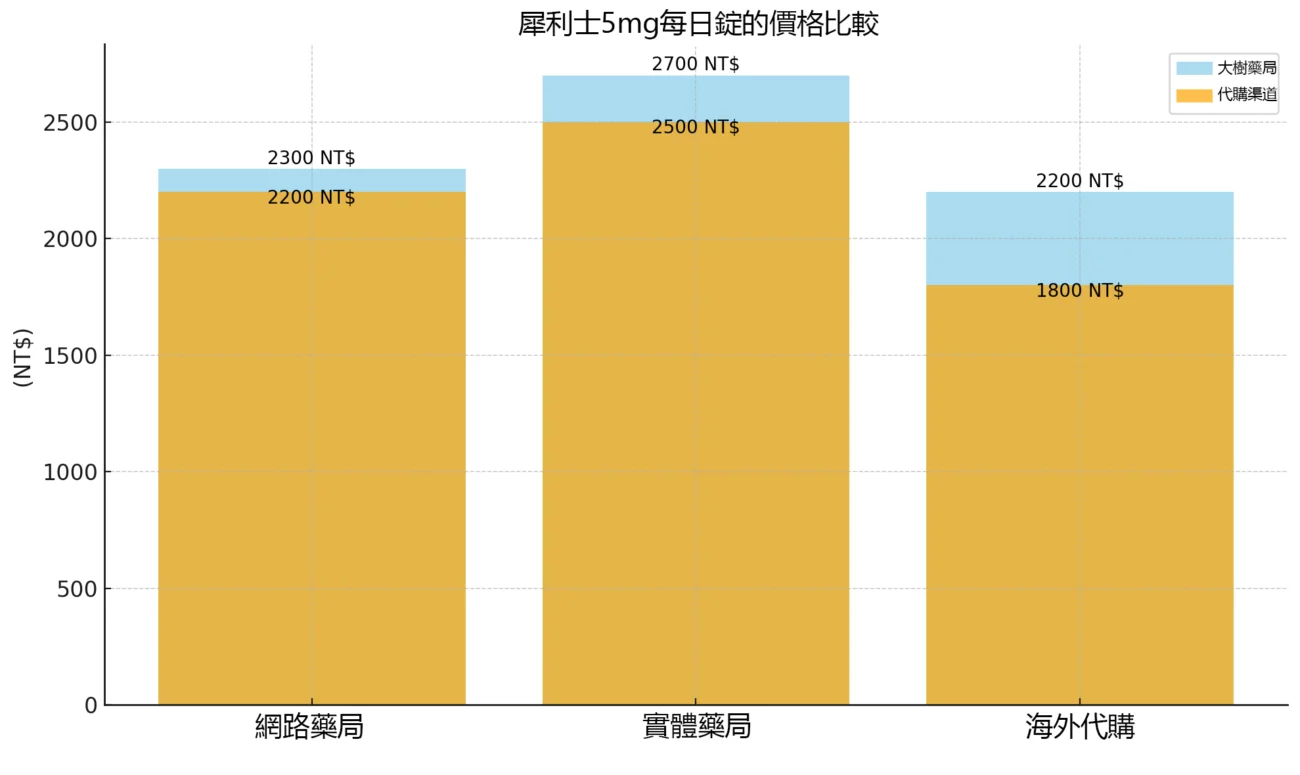犀利士5mg(Cialis-5毫克)是目前市面上廣受歡迎的長期治療勃起功能障礙(ED)和前列腺肥大(BPH)藥物。它的特點在於每日服用的低劑量,使男性能夠隨時進行性生活,無需計劃或提前服藥。那麼,這款犀利士5mg哪裡買?購買時需要注意什麼?價格如何?本篇文章將提供詳細的購買指南、價格比較和使用建議,幫助您找到最佳的購買方式。
犀利士5mg是什麼

犀利士5mg是一種長效PDE5抑制劑,主要成分是他達拉非(Tadalafil)。這種藥物通過放鬆陰莖和平滑肌組織,增加血液流動來改善勃起功能障礙。與傳統按需服用的犀利士相比,5mg每日錠的特點在於長期、穩定的效果,非常適合需要日常維持治療的患者。
犀利士5mg的主要優點:
- 自然持久:每日服用可以讓使用者在沒有壓力和計劃的情況下隨時進行性生活。
- 雙重功效:不僅有助於改善勃起功能障礙(ED),還能緩解前列腺肥大的症狀(BPH)。
- 穩定效果:通過每日低劑量服用維持血藥濃度,減少按需服用時可能產生的不確定性。
犀利士5mg哪裡買?

1. 網路藥局

網路藥局是當前最方便的購買渠道之一,您可以直接在線上下單,享受送貨到家的服務。大多數大型網路藥局提供正品藥物、價格透明,並提供專業的藥師咨詢服務。
推薦的網路藥局:
- 大樹藥局(https://greaoptree.com.tw/):大樹藥局提供多款犀利士產品,保證正品,且支持宅配與超商取貨服務。
- 大樹露天購物網(https://rutenshop.com.tw/):提供犀利士5mg每日錠,並有專業藥師的在線咨詢服務,方便且可靠。
2. 實體藥局

實體藥局也是購買犀利士5mg每日錠的安全選擇之一。您可以在附近的實體大樹藥局進行購買,但需注意,台灣的犀利士5mg每日錠屬於處方藥,需要醫師開具處方。在購買前,建議先向藥局確認產品是否有庫存。
3. 海外代購

如果您希望選擇更便宜的購買方式,海外代購是一個不錯的選擇。由於印度和香港等地擁有多家生產犀利士的正規製藥公司,代購服務可以提供較便宜的價格。但需要注意運輸時間較長,且存在海關查驗等風險。
4. 跨境電商

部分跨境電商平台如蝦皮購物、eBay等也提供犀利士5mg每日錠的購買選項。購買前務必確認賣家的評價和產品來源,避免購買到仿冒品。
購買犀利士5mg注意事項

- 選擇正規渠道:無論是網購、實體藥局還是代購,都應選擇信譽良好的平台,避免因貪圖便宜而購買到假貨或劣質藥物。
- 確認產品來源:犀利士5mg每日錠的主要生產地是印度和美國,購買時務必確認產品的包裝、標識及認證標誌,確保所購產品為正品。
- 諮詢專業意見:由於犀利士5mg每日錠適合長期服用,因此在使用前應先諮詢專業醫師或藥師,了解適合的劑量和用法。
- 注意副作用:犀利士5mg每日錠可能引發頭痛、面部潮紅、胃部不適等副作用,服用後如有不適,應立即停止並尋求醫療建議。
四、犀利士5mg價格比較

購買犀利士5mg每日錠的價格會根據購買渠道、包裝規格和劑量而有所變動。以下是一些常見的價格範圍供您參考:
- 網路藥局:價格大約在 NT$1600 至 NT$1800 之間,具體價格取決於購買的數量和包裝規格。
- 實體藥局:價格通常會稍高於網路藥局,大約在 NT$1700 至 NT$2000 之間,購買時需出示處方箋。
- 海外代購:價格相對較低,但需要支付運費和等待時間,大約在 NT$1200 至 NT$1500 左右。
犀利士5mg吃法

犀利士5mg每日錠的標準劑量為每日5mg。建議每天於相同時間服用,以保持穩定的血藥濃度。這種每日服用的設計,使得使用者能夠不必臨時服藥,讓性生活變得更自然隨意。
使用建議:
- 每日服用一次:盡量在每天固定的時間服用,以達到最佳效果。
- 避免過量服用:每日5mg的劑量足以維持藥效,避免隨意增加劑量,以免產生副作用。
- 配合健康生活方式:服用犀利士的同時,建議保持健康的飲食和規律的運動,以達到更好的治療效果。
六、藥師總結

犀利士5mg每日錠是一種便捷且有效的治療勃起功能障礙和前列腺肥大的藥物。無論您選擇網路購物、海外代購還是實體藥局購買,都應謹慎選擇合法的購買渠道,確保所購藥品為正品。同時,在專業醫師或藥師的指導下正確使用,避免因錯誤服用而出現副作用。
如果您對於犀利士5mg每日錠的購買有任何疑問或需要更多的用藥建議,歡迎隨時聯繫我們的專業藥師團隊,我們將提供全面的用藥指導。
Vimax哪裡買 偉哥哪裡買 日本藤素哪裡買 犀利士哪裡買 犀利士5mg哪裡買 雙效犀利士哪裡買 必利勁哪裡買 必利吉哪裡買 果凍偉哥哪裡買 雙效果凍偉哥哪裡買 雙效偉哥哪裡買 女用偉妹哪裡買 印度紅魔哪裡買 美國GOODMAN哪裡買 美國黑金哪裡買美國黑金哪裡買 泰坦凝膠哪裡買 德國必邦哪裡買 德國必邦哪裡買泰坦凝膠哪裡買大樹露天購物網 果凍威而鋼 雙效犀利士 印度紅魔 超級艾力達 印度綠水鬼 必利吉 綠膜口溶膜 kamagra哪裡買 泰國果凍女用日本藤素哪裡買 日本藤素哪裡買泰國果凍威而鋼哪裡買 泰國果凍威而鋼哪裡買必利勁哪裡買 必利勁哪裡買威而柔哪裡買 威而柔哪裡買威而鋼果凍正確用法教學 威而鋼果凍哪裡買 威而鋼哪裡買 德國必邦哪裡買 印度–藍鑽超級威而鋼雙效片哪裡買 樂威壯哪裡買 雄鷹持久液 SUPERVIGA240000哪裡買 加拿大Vimax增大丸哪裡買 威而鋼Suhagra 100哪裡買 樂威壯雙效片Super Levifil哪裡買 日本藤素價錢 日本藤素禁忌威而鋼果凍哪裡買 威而鋼哪裡買 德國必邦哪裡買 印度–藍鑽超級威而鋼雙效片哪裡買 樂威壯哪裡買 雄鷹持久液 SUPERVIGA240000哪裡買 加拿大Vimax增大丸哪裡買 威而鋼Suhagra 100哪裡買 樂威壯雙效片Super Levifil哪裡買 日本藤素價錢 日本藤素禁忌 日本藤素可以每天吃嗎?威而鋼果凍正確用法教學 威而鋼果凍哪裡買 威而鋼哪裡買 德國必邦哪裡買 印度–藍鑽超級威而鋼雙效片哪裡買 樂威壯哪裡買 雄鷹持久液 SUPERVIGA240000哪裡買 加拿大Vimax增大丸哪裡買 威而鋼Suhagra 100哪裡買 樂威壯雙效片Super Levifil哪裡買 日本藤素價錢必利勁副作用有哪些?藥師為你答疑解惑! Hamer汗馬糖哪裡買?購買正品汗馬糖的渠道講解! 必利勁哪裡買?藥師詳解購買必利勁的兩種通路! 雙效犀利士哪裡買?購買正品雙效犀利士渠道講解!!屈臣氏有日本藤素賣嗎?醫師:屈臣氏沒有! 日本藤素副作用與處理方法:瞭解藤素副作用常見迷思 【日本藤素沒用】藤素是偽藥嗎?瞭解藤素無效的原因有哪些 宮廷玉液是什麼 催情奶茶是什麼 皇家蜂蜜是什麼 卡宴伊圃園是什麼 BMW催情液是什麼 宮廷玉液是什麼 催情奶茶是什麼 皇家蜂蜜是什麼 卡宴伊圃園是什麼 BMW催情液是什麼日本藤素功效好嗎?藥師講解日本藤素的五大效果! 日本藤素官網丨四代日本藤素真正官方地址入口 日本藤素價錢:線上購買日本原廠藤素價格低廉 日本藤素dcard:鄉民親測服用日本藤素心得分享! 日本藤素假貨:露天購買的藤素居然全是假貨?購買藤素必看!! 日本藤素禁忌:服用藤素應注意哪些? 想要重震雄風?正版日本藤素丨讓你焕發自信! 日本藤素PTT:四代藤素成分及功效丨藥師詳解女用果凍威而鋼哪裡買 威而鋼果凍正確用法教學 威而鋼果凍哪裡買 威而鋼哪裡買 德國必邦哪裡買 印度–藍鑽超級威而鋼雙效片哪裡買 樂威壯哪裡買 雄鷹持久液 SUPERVIGA240000哪裡買 加拿大Vimax增大丸哪裡買 威而鋼Suhagra 100哪裡買 樂威壯雙效片Super Levifil哪裡買 日本藤素價錢 日本藤素禁忌 日本藤素可以每天吃嗎? 日本藤素沒用金蒼蠅迷情液是什麼 一滴銷魂是什麼 濃情口香糖是什麼 金蒼蠅迷情液是什麼 一滴銷魂是什麼 濃情口香糖是什麼 美國MAXMAN哪裡買 美國MAXMAN哪裡買犀利士5mg每日錠哪裡買站群站群站群站群站群站群站群站群站群站群站群站群站群 林林藥局 林林藥局 林林藥局 壯陽藥局






